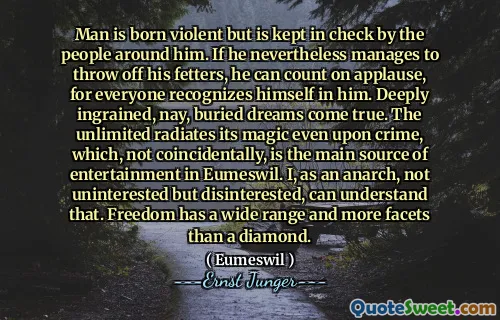Ernst Jünger was a German writer and philosopher, recognized for his profound and sometimes controversial insights on war, technology, and human experience. Born in 1895, he first gained fame for his detailed accounts of World War I, particularly in his book "Storm of Steel," which reflects on the nature of conflict and the soldier's experience. His works often explore the duality of human existence and the relationship between nature and technology, themes that resonate throughout his literary career. Jünger's writings delve into the psychological impacts of war, often portraying it not just as a destructive force but as a transformative experience. His perspective on warfare borders on the heroic, emphasizing a stoic acceptance of fate and an appreciation for the beauty found in struggle. This approach has drawn criticism, as some view it as romanticizing violence, while others find value in his existential reflections. In his later works, Jünger shifted towards philosophical explorations of technology and its effects on society. He examined the implications of modernization on human identity and behavior, positing that the individual's experience is increasingly mediated by technological advancements. His thoughts remain relevant today, as debates surrounding technology and humanity continue to evolve, reflecting the complexities of modern existence.
Ernst Jünger was a prominent German writer and thinker known for his compelling exploration of war, technology, and human nature. Born in 1895, he gained notoriety with his first-hand accounts of World War I, particularly in "Storm of Steel," which outlines the soldier's experience during the conflict.
Jünger's work often portrays the dual nature of warfare, combining reflections on the destructive elements with an acknowledgment of its transformative aspects. He examines the psychological impact of battles and often takes a philosophical stance on the complexities of fate, identity, and existence in a changing world.
Later in his career, Jünger shifted focus to the philosophical implications of technology, discussing its influence on humanity and individual experiences. His ideas continue to resonate in contemporary discussions about the relationship between people and the technological advancements that shape modern life.
More »
Today Birthdays
1896 -
John Dos Passos
1960 -
Edward St Aubyn
1925 -
Yukio Mishima
1875 -
Albert Schweitzer
1919 -
Andy Rooney
1952 -
Maureen Dowd
1957 -
Anchee Min
1969 -
Dave Grohl
1988 -
Tom Rosenthal
1913 -
Tillie Olsen
1949 -
Lawrence Kasdan
1920 -
George Herman
1801 -
Jane Welsh Carlyle
1969 -
Jason Bateman
1892 -
Hal Roach
1941 -
Faye Dunaway
1968 -
LL Cool J
1982 -
Aaron Koblin
1943 -
Shannon Lucid
1940 -
Trevor Nunn
1942 -
Carol Bellamy
1978 -
Kuno Becker
1977 -
Yandel
1948 -
Carl Weathers
1947 -
Bev Perdue
1981 -
Trieste Kelly Dunn
